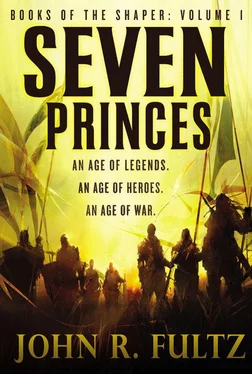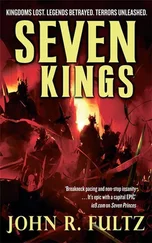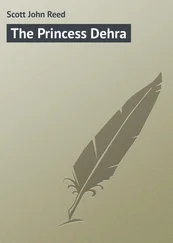John Fultz - Seven Princes
Здесь есть возможность читать онлайн «John Fultz - Seven Princes» весь текст электронной книги совершенно бесплатно (целиком полную версию без сокращений). В некоторых случаях можно слушать аудио, скачать через торрент в формате fb2 и присутствует краткое содержание. Жанр: Фэнтези, на английском языке. Описание произведения, (предисловие) а так же отзывы посетителей доступны на портале библиотеки ЛибКат.
- Название:Seven Princes
- Автор:
- Жанр:
- Год:неизвестен
- ISBN:нет данных
- Рейтинг книги:5 / 5. Голосов: 1
-
Избранное:Добавить в избранное
- Отзывы:
-
Ваша оценка:
- 100
- 1
- 2
- 3
- 4
- 5
Seven Princes: краткое содержание, описание и аннотация
Предлагаем к чтению аннотацию, описание, краткое содержание или предисловие (зависит от того, что написал сам автор книги «Seven Princes»). Если вы не нашли необходимую информацию о книге — напишите в комментариях, мы постараемся отыскать её.
Seven Princes — читать онлайн бесплатно полную книгу (весь текст) целиком
Ниже представлен текст книги, разбитый по страницам. Система сохранения места последней прочитанной страницы, позволяет с удобством читать онлайн бесплатно книгу «Seven Princes», без необходимости каждый раз заново искать на чём Вы остановились. Поставьте закладку, и сможете в любой момент перейти на страницу, на которой закончили чтение.
Интервал:
Закладка:
What if I had done nothing?
“Dry your tears,” said Iardu, patting her shoulder. “It’s not as bad as all that.”
She glared at him. His eyes gleamed in their myriad colors. The blue flame guttered low on his chest. His robes had been restored, but the dark bruises on his skin remained.
“My cousins are all dead,” she reminded him. “My aunts, uncles… an entire city!”
“No,” he said. “Thousands of women and children survive. See them milling in the courtyard there. Vireon is their hero, their savior. Alua is their new Goddess.”
Sharadza watched them in the ensorcelled water. Grimy faces bright with tears stared upon Vireon and Alua, raw hope glimmering in their eyes. Among the smoking ruins of an empire, those people refused to give up. Surely Vireon would take them to Udurum. And there he would be King. What of Shar Dni? Perhaps, over time, it might be rebuilt as Udurum once was. Yet there were no Giants to rear its new walls and raise its towers. No, it would remain a haunted ruin.
Iardu waved his hand and the watery view shifted to the open sea. The black ships of Khyrei sailed southward. What must those captains and soldiers feel in their hearts now that their wicked Empress was gone? Which one of them would rise to replace her, and bring more war in some distant year?
“Their fleet is leaderless and vulnerable,” said Iardu. “If you wish, I might summon a hurricane and drown them all.”
“No!” She shook her head, a mass of black curls twirling. “There has been enough death. Leave them be.”
“As you wish,” he said. “Perhaps they will choose a more peaceful way of life without Ianthe the Claw driving them to conquest.”
She heard the doubt in his words. He did not believe them himself.
“What about D’zan?” she said. “What has happened to him?”
Iardu dispelled the image with a dip of his finger into the pool. The vision turned to ordinary ripples. Songbirds trilled in the cypress branches, and the smell of citrus hung heavily about the garden. Somewhere inside the palace walls D’zan sat or wandered wordless and grim, a prisoner of his own dead flesh.
“Elhathym killed him,” said Iardu. “Yet his spirit refused to abandon his body. By embracing death instead of running from it, he defeated his enemy.”
“How could he do this?” she asked.
Iardu shrugged. “You saw the gleaming sign on his forehead, the mark of the Sun God. His belief in this power made it real. This is the sorcery that all men are capable of working… the magic of Faith. They give credit to the Gods for their own works. Try to tell them this, however, and they call you Heretic.” He smiled.
“What will become of him?”
“His physical shell will continue to rot and decay with his spirit trapped inside. Eventually, he will be a dried, animate skeleton. The people will fear him and call him worse than Elhathym. Unless…”
“Unless what?” she asked. “What can we do?”
Iardu stared into the green leaves dappled with sunlight. The Flame of Intellect blazed on his breast. “Did you know that the hair and fingernails of corpses continue to grow even in the grave?”
They left the gardens and entered the palace. Servants and soldiers were busy removing all trace of Elhathym’s brief reign, cleaning for the coming feasts and the official coronation of the young King. Sharadza and Iardu found D’zan sitting still upon his throne, from which he barely moved at all. In the last few hours the throne room had regained much of its grandeur. Fresh tapestries of Yaskathan ancestry lined the walls. Dust and blood and bones had been scoured away, and the Vizier’s podium was restored to its rightful place. The throne that Iardu had conjured from marble had been set with a fresh coterie of jewels. Beams of sunlight showered through the vertical casements.
D’zan wore a silver breastplate engraved with the sword and tree, a crimson cloak, and leggings of white silk tucked into tall black boots. On his sallow face sat a slim crown of gold studded with six emeralds and a single brilliant red opal. His eyes sat like heavy stones in the center of black sockets, and the flesh grew tight about his skull. The hole in his chest was completely covered by the corselet, and gloves of dark leather hid the pallid skin of his hands. As before, the greatsword lay across his knees, oiled and gleaming bright as his crown.
Iardu climbed the dais and spoke to him in whispers. At length D’zan sighed and nodded. He arose and followed them into the garden. There he gave an order, in a voice like sand on stone, that his two guests and he not be disturbed.
The Shaper found a secluded glade rimmed by blossoming pomegranate trees. Here D’zan lay down upon the grass, the sword on his chest pointing toward his feet. His gloved hands wrapped about the hilt like a slain hero fit for burial, which in many ways he was.
Sharadza let Iardu lead the spell. She played the role of student and protegee.
He plucked a single strand of D’zan’s brown-blonde hair from his head and breathed upon it; he gathered naked sunlight in his right hand and invested it into the strand. Then he offered it to Sharadza, who poured her own breath upon it and pricked her finger with a pin so that a single drop of her blood fell upon the hair.
Iardu let go of the strand and it floated down to the green sward next to D’zan. Now Iardu sang over the strand in the grass, and Sharadza watched in awe. The hair grew into a rope, then wound upon itself to create an oval. Drops of white fire fell from Iardu’s hand upon the oval and it melted into a shape like that of a newborn baby.
As Iardu sang, he made the sign Sharadza had been waiting for. She poured a ewer of fresh water and another of seawater over the infant sculpture. The substance of hair became flesh, and it grew longer and more solid. Iardu dropped a shard of white bone upon its belly, and the flesh rippled, taking the bone into itself. Now the shape lyinge shape near D’zan was that of a young boy, the hardness of bones filling its limbs. Soon the young boy was a young man, a twin to D’zan before his death. Its eyes were closed as if in sleep.
Sharadza took D’zan’s sword from his cold hands and wrapped the new body’s warm fingers about its hilt. Then she took the crown from the rotting head and placed it on the fresh one. Now Iardu bent over the rotting corpse and pulled something miraculous from its mouth – a glowing orb large as an orange and blazing brightly even in the sunlight. He held it out to Sharadza. She took it in her hands gingerly, as if it were a delicate crystal. It hummed, warm and beautiful in her cupped palms. She knelt and dropped it into the open mouth of D’zan’s new body.
His new eyes opened. They were sparkling, and as green as her own.
He sat up, inhaling air with freshly molded lungs. She glanced at the corpse and saw that it was now truly lifeless… only a husk of dissolving skin and muscle. These two were twins – one living, one dead. She put her arms around the new D’zan. He could not speak or see yet – while Iardu stripped armor and clothing from the empty corpse. She helped D’zan then to stand in his new body, and he blinked at her, voiceless. His eyes gleamed at her. They had been dark before, but now they were bright as emeralds.
They helped him to dress in tunic, corselet, cloak, leggings, and boots. By that time he had regained his voice. He spoke his first words to Sharadza, an intimate whisper.
“You are beautiful,” he said. “I wanted to tell you this since I first saw you.”
She smiled at him and could do little else. He stood on his own now, a proud young King restored to health and vigor.
“Thank you, Shaper” he said, taking Iardu’s hand. “Now that I live again, my kingdom will live. I will never forget what you have done this day.”
Читать дальшеИнтервал:
Закладка:
Похожие книги на «Seven Princes»
Представляем Вашему вниманию похожие книги на «Seven Princes» списком для выбора. Мы отобрали схожую по названию и смыслу литературу в надежде предоставить читателям больше вариантов отыскать новые, интересные, ещё непрочитанные произведения.
Обсуждение, отзывы о книге «Seven Princes» и просто собственные мнения читателей. Оставьте ваши комментарии, напишите, что Вы думаете о произведении, его смысле или главных героях. Укажите что конкретно понравилось, а что нет, и почему Вы так считаете.












